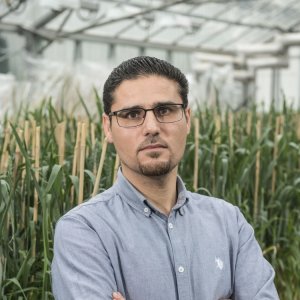
Abdul Kader’s research aims to understand the genetic basis of meiosis in wheat and to identify the genes responsible for the sensitive of meiosis to temperature stress.
Wheat production will need to increase by 60% in the next 50 years. However, this increase will be challenged by the predicted climatic change.
Temperatures are predicted to fluctuate globally by several degrees by the end of this century. Higher temperatures during wheat’s flowering can have a major effect on subsequent grain yield. Meiosis is a type of cell division where a single cell divides twice to generate four gamete cells with half the original chromosomal complement.
Meiosis, like many other biological processes, is sensitive to variation in the environment, especially temperature. Previous studies showed that deletion of chromosome 5D in wheat (in Chinese Spring N5DT5B) increases the sensitivity of wheat meiosis to high and low temperature, leading to complete male sterility at 12 °C.
Abdul Kader’s work involves characterising the locus on chromosome 5D in wheat, which when deleted, makes wheat chromosome pairing during meiosis very sensitive to temperature stress and leads to almost complete failure in chromosome exchange. This goal is being approached by exploiting the unprecedented available wheat genomics resources and tools, including the wheat TILLING populations.
To gain insight into the bigger picture, Abdul Kader is aiming to generate RNA-seq data of isolated meiocytes under low and high temperature conditions, which will help to elucidate the transcriptome landscape of wheat meiosis under temperature stress.
